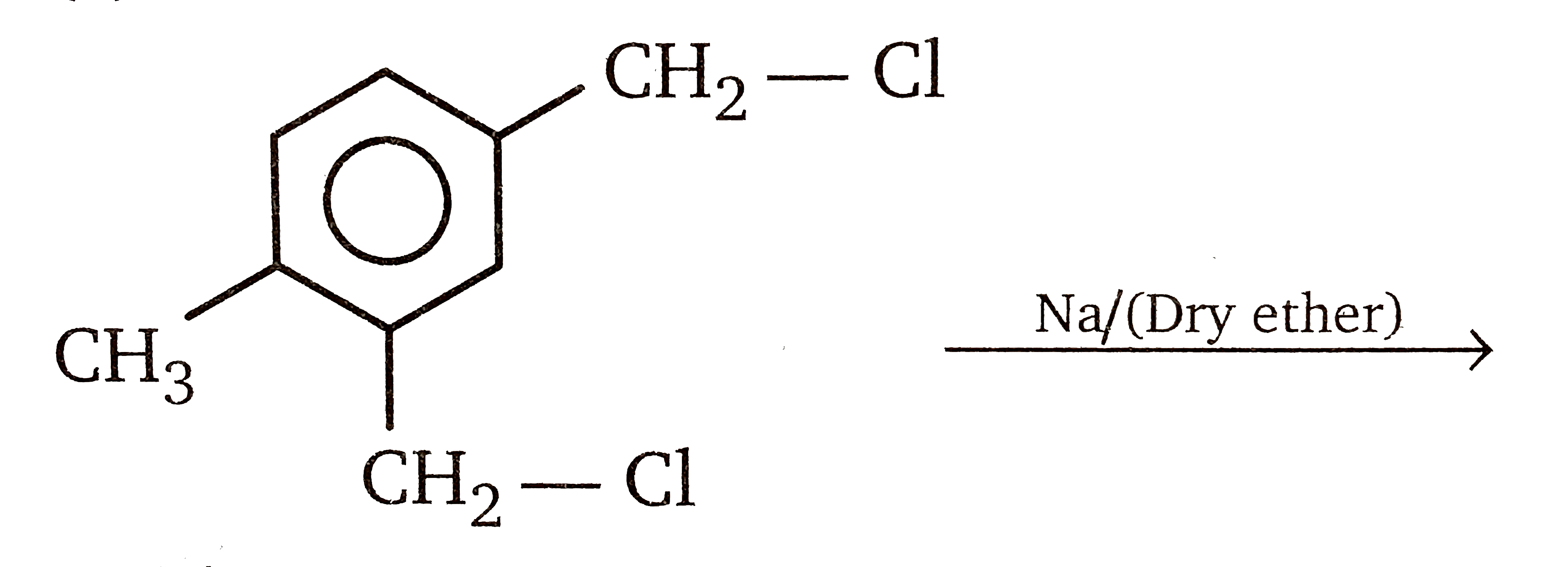Which of these do not underg Wurtz reaction
C2H5F
C2H5Br
C2H5Cl
C2H5I
The correct Answer is:A
To determine which of the given halogen-containing compounds do not undergo the Wurtz reaction, we first need to understand the nature of the Wurtz reaction and the properties of the halogens involved.
1. Understanding the Wurtz Reaction:
The Wurtz reaction involves the coupling of alkyl halides (RX) in the presence of sodium metal in an ether solvent. The general reaction can be represented as:
2R−X+2Na→R−R+2NaX
Here, R is an alkyl group, and X is a halogen (F, Cl, Br, I).
2. Identifying the Halogens:
The halogens we need to consider are Fluorine (F), Chlorine (Cl), Bromine (Br), and Iodine (I). The ability of these halogens to participate in the Wurtz reaction varies based on their bond strength and leaving group ability.
3. Analyzing Each Halogen:
- Fluorine (F): The C-F bond is very strong, making it difficult to break. Additionally, fluorine is a poor leaving group. Therefore, alkyl fluorides do not undergo the Wurtz reaction effectively.
- Chlorine (Cl): Chlorine is a better leaving group than fluorine, and the C-Cl bond is weaker than the C-F bond. Thus, alkyl chlorides can undergo the Wurtz reaction.
- Bromine (Br): Bromine is also a good leaving group, and the C-Br bond is weaker than the C-Cl bond, making alkyl bromides favorable for the Wurtz reaction.
- Iodine (I): Iodine is an excellent leaving group, and the C-I bond is the weakest among the halogens, allowing alkyl iodides to undergo the Wurtz reaction readily.
4. Conclusion:
Based on the analysis, the halogen that does not undergo the Wurtz reaction effectively is Fluorine (F). Therefore, the answer to the question is:
Fluorine (F) does not undergo the Wurtz reaction.
Final Answer:
Fluorine (F) is the halogen that does not undergo the Wurtz reaction.
The Wurtz reaction involves the coupling of alkyl halides (RX) in the presence of sodium metal in an ether solvent. The general reaction can be represented as:
2R−X+2Na→R−R+2NaX
Here, R is an alkyl group, and X is a halogen (F, Cl, Br, I).
The halogens we need to consider are Fluorine (F), Chlorine (Cl), Bromine (Br), and Iodine (I). The ability of these halogens to participate in the Wurtz reaction varies based on their bond strength and leaving group ability.
- Fluorine (F): The C-F bond is very strong, making it difficult to break. Additionally, fluorine is a poor leaving group. Therefore, alkyl fluorides do not undergo the Wurtz reaction effectively.
- Chlorine (Cl): Chlorine is a better leaving group than fluorine, and the C-Cl bond is weaker than the C-F bond. Thus, alkyl chlorides can undergo the Wurtz reaction.
- Bromine (Br): Bromine is also a good leaving group, and the C-Br bond is weaker than the C-Cl bond, making alkyl bromides favorable for the Wurtz reaction.
- Iodine (I): Iodine is an excellent leaving group, and the C-I bond is the weakest among the halogens, allowing alkyl iodides to undergo the Wurtz reaction readily.
Based on the analysis, the halogen that does not undergo the Wurtz reaction effectively is Fluorine (F). Therefore, the answer to the question is:
Fluorine (F) does not undergo the Wurtz reaction.
Fluorine (F) is the halogen that does not undergo the Wurtz reaction.
Similar Questions
Knowledge Check
- Question 1 - Select One
Which of the following Wurtz's reaction will fail to give the expected product?
A B
B C
C D
D
- Question 2 - Select One
Which one is not prepared by Wurtz reaction ?
AC2H6Bn−C4H10CCH4DCH3−CH3∣CH−CH3∣CH−CH3 - Question 3 - Select One
The solvent used in Wurtz reaction is
AC2H5OH(aq)BCH3COOHCH2ODC2H5OC2H5(dry)
Ethyle iodide and n-propyl iodide are allowed to undergo Wurtz reaction. The alkane which will not be obtained in this reaction is:
View Solution
Product of the above Wurtz reaction is:View SolutionWhich of the following underges suluphonation fast ?
View SolutionWhich of the following is Wurtz-Fitting reaction?
View SolutionWhich of the following alkanes cannot be synthesised by the Wurtz reaction in a good yield ?
View Solution

